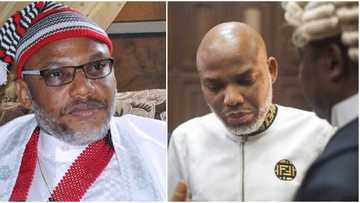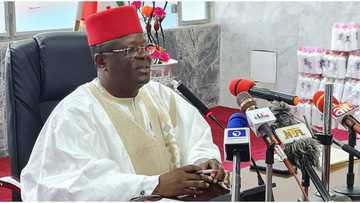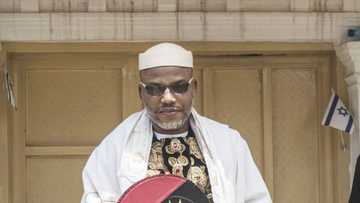Explainer: Why Appeal Court Declared Nnamdi Kanu Discharged, Acquitted
On Thursday, October 13, the Court of Appeal in Abuja, quashed the terrorism charge the Federal Government preferred against the detained leader of the Indigenous People of Biafra, IPOB, Nnamdi Kanu.
PAY ATTENTION: Click “See First” under the “Following” tab to see Legit.ng News on your Facebook News Feed!
It discharged and acquitted him of the seven-count charge pending against him before the Federal High Court in Abuja.
The appellate court, in a decision by a three-man panel led by Justice Jummai Hanatu, said it was satisfied that FG flagrantly violated the law when it forcefully rendered Kanu from Kenya to the country for the continuation of his trial.

Source: UGC
Meanwhile, Kanu had in his appeal dated April 29 applied to be discharged and acquitted. Kanu was first arraigned on December 23, 2015, and was later granted bail on April 25, 2017.
This article by Legit.ng takes a look at crucial reasons why the court freed Nnamdi Kanu
PAY ATTENTION: Share your outstanding story with our editors! Please reach us through info@corp.legit.ng!
1. Unlawful arrest and detention
The Court of Appeal on Thursday declared as illegal and unlawful, the abduction of Kanu from Kenya to Nigeria and quashed the entire terrorism charges brought against him by the Federal Government.
2. Breach of international laws
The court held that the Appellate Court held that the Federal Government breached all local and international laws in the forceful rendition of Kanu to Nigeria thereby making the terrorism charges against him incompetent and unlawful.
The Appeal Court in a judgment by Justice Oludotun Adebola voided and set aside the charges by the Federal Government against Kanu.
The Appeal Court in a judgment by Justice Oludotun Adebola voided and set aside the charges by the Federal Government against Kanu.
3. The government did not follow due process
Justice Adebola held that the failure of Nigeria to follow due process by way of Extradition was fatal to the charges against Kanu.
The Appeal Court further held that the failure of the Federal Government to disclose where and when the alleged offences were committed was also fatal to the terrorism charges and made them liable to dismissal.
The court held that "Mr Kanu’s extradition from Kenya in June 2021 to Nigeria without following the extradition rules was a flagrant violation of Nigeria’s extradition treaty and a breach of the IPOB leader’s fundamental human rights."
It held there was no denial by the Nigerian government’s lawyer, David Kaswe, in the appeal as to the submissions of Mike Ozekhome, Mr Kanu’s counsel, that the separatist leader was “extraordinarily renditioned from Kenya.”
4. FG did not examine its findings
The appellate court held that the failure of the federal government to adequately respond to Kanu’s arguments gave merit to the appeal.
The court further said also the Federal High Court failed to examine the findings of the prosecution as it would not have tried Kanu on the grounds that the IPOB leader was not “illegally brought into the country.”
The charges struck out include the ones instituted against Mr Kanu before he was brought back to Nigeria last year.
What the three-man panel said
Justice Jummai in her judgment said the Appeal Court will not make the same mistake the lower court made, BBC Pidgin reported.
She said,
"Even though they have a warrant of arrest, even though the government told them to arrest Kanu, as far as it is not inside the shores of Nigeria that he committed the alleged offences, the arrest and forceful return to Nigeria is illegal."
She explained further that to even sued Kanu to court immediately was improper because the appellate court has the right to the notification so that Kanu would have enough time to prepare himself on how to defend himself in court.
“The court will never shy away from calling the Executive to order when it tilts towards Executive recklessness”, the Appellate court held, even as it accused FG of engaging in “serious abuse of power”.
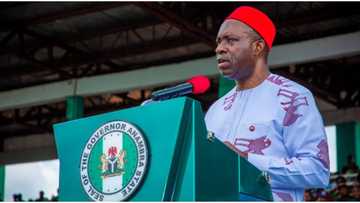
Read also
Just in: Anambra government shuts down all gaming centres in the state, gives strong reason
"The lower court also make mistake as they did not address all the issues and answer all the questions raised by the appellant," The judge rule.
Di lower court also make mistake as dem no address all di issues and answer all di questions raised by di appellant." Di judge rule.
Below are the full details of the seven charges that were struck out
The judge ordered that the case proceeds to trial on Counts 1, 2, 3, 4, 5, 13 and 15.
Five of the sustained charges have to do with alleged acts of terrorism, including professing to be a member and leader of IPOB, a proscribed organisation, issuing inciteful and deadly threats against individuals, and issuing directives, among others.
Count 15 has to do with the illegal importation of a radio transmitter he declared as used household items in violation of section 47 (2) (a) of the Criminal Code Act. Cap, C45 Laws of the Federation of Nigeria 2004, Premium Times noted.
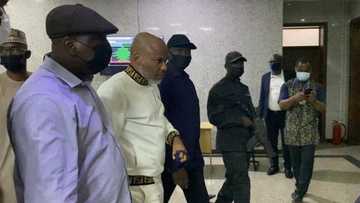
Read also
Nnamdi Kanu: FG finally drags IPOB leader to Supreme Court, files 7 grounds against appeal court judgement
Full details of the counts:
Count 1
The prosecution alleged that Mr Kanu, of Afara Ukwu, Umuhahia North Local Government Area of Abia State, as a member of and leader of proscribed IPOB sometimes in September 2021, committed an act of terrorism against Nigeria and its people by allegedly making a broadcast received and heard in Nigeria with intent to intimidate the population, threatened that the people would die and that the whole world would standstill. The offence is said to be punishable under section 1(2)(b) of the Terrorism Prevention Amendment Act 2015.
Count 2
The prosecution accused him of committing “an act in furtherance of an act of terrorism” against Nigeria and its people made a broadcast received and heard in Nigeria within the jurisdiction of the court with intent to intimidate the population, issued a death threat against anyone who flouted his sit-at-home order.
Kanu allegedly ordered whoever flouted the order should “write his/her will”, and as a result banks, schools, markets, shopping malls, and fuel stations domiciled in the eastern states of Nigeria must not open for business. Citizens, and vehicular movements, in the eastern states of Nigeria, the prosecution said, were grounded as a result of the sit-at-home order.
The prosecution said the offence is punishable under section 1(2)(b) of the Terrorism (Prevention) Amendment Act (2013).
Count 3
The prosecution also alleged that “on diverse dates” between 2018 and 2021 within the jurisdiction of this court, Mr Kanu professed himself to be a member and leader of IPOB, a proscribed organisation in Nigeria.
This, the prosecution said was an offence contrary to and punishments under section 16 of the Terrorism Prevision Amendment Act 2015.
Count 4
M Kanu also, allegedly, on diverse dates between 2018 and 2021, made a broadcast received and heard in Nigeria inciting members of the public in Nigeria in furtherance of an act of terrorism against Nigeria and its people to hunt and kill Nigerian security personnel.
The offence, according to the prosecution, is punishable under section 1(2)(h) of the Terrorism Prevention Amendment Act 2013.
Count 5
Kanu, also on diverse dates between 2018 and 2021, allegedly broadcasted furtherance of an act of terrorism against Nigeria and its people received and heard in Nigeria in furtherance of an act of terrorism, inciting members of the public in Nigeria to hunt and kill families of Nigeria security personnel.

Read also
2023: Labour Party's growing fame dwarfed as court remands candidate in prison for alleged murder
The offence is said to be punishable under 1(2)(h) of the Terrorism Prevention Amendment Act 2013.
Count 13
Kanu also alleged between 2018 and 2021 made a broadcast received and heard in Nigeria with the intent to incite violence, in furtherance of an act of terrorism against Nigeria and its people, directed members of the public to burn down every federal facility in Lagos resulting in major economic loss to the federal government.
The alleged offences, the prosecution says, are punishable under section 1(2) of the Terrorism (Prevention) Amendment) Act 2013.
Court 15
The prosecution also alleged that on diverse dates between March and April 2015 Mr Kanu was illegally imported into Nigeria and kept in Ubulisluzor in Ihiala Local Government Area of Anambra State, a radio transmitter known as Tram 50L concealed in a container of used household items which he declared as used household items.
The alleged offence was said to be contrary to section 47(2)(a) of Criminal Code Act CapC45 Laws of the Federation of Nigeria 2004.
Appeal Court terminates Nnamdi Kanu’s trial, orders IPOB leader’s release
“Nnamdi Kanu is seriously ill, suffers from intestinal disorder”, Lawyer alleges
The health of the leader of the Indigenous People of Biafra (IPOB), Nnamdi Kanu, has worsened.
The IPOB leader had been diagnosed with gastrointestinal disorder following persistent heartburn, his lawyer and human rights activist, Ifeanyi Ejiofor, confirmed through a statement on Monday, September 19.
According to him, despite the order of Justice Binta Nyako of a Federal High Court in Abuja that the IPOB leader should be given serious medical attention, the Department of State Services (DSS) has been acting, on the contrary.
Source: Legit.ng


